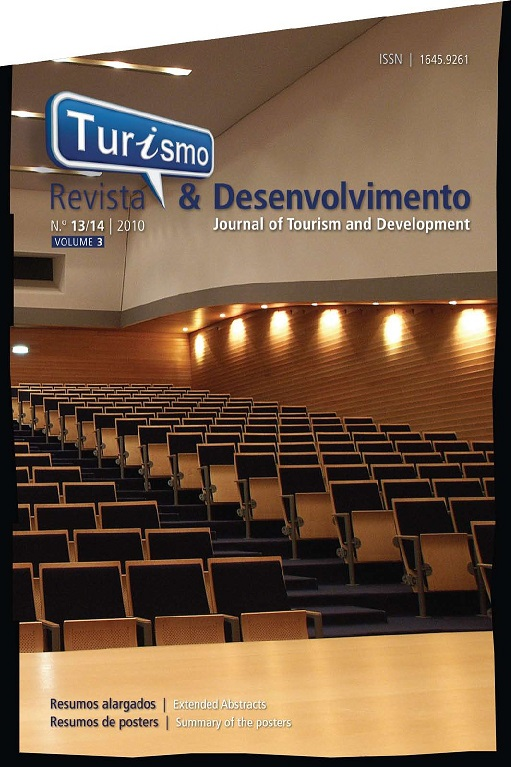Women’s skills and constraints to vertical mobility in the tourism sector
Resumo
Objectives | Thiscommunication presentsthe preliminaryresults of a broader project, entitled Towards the improvement of women’s skills in the tourism sector. Profiting from the vertical mobility for ethic and economic purposes. This project aims at making a diagnosis of organisations in the tourism sector and their managerial personnel, analysing and evaluating the reasons for and constraints to women’s vertical mobility, as well as creating a model that allows women’s career progression and the optimisation of the human capital of companies. This communication presents the first results of this research. It aims at:
– examining the importance of women in the tourism sector;
– analysing and evaluating the reasons for and the constraints to women’s vertical mobility;
– comparing women’s skills and higher education training with their employment;
– identifying important indicators for the study of women’s employment and vertical mobility;
– suggesting some measures to the improvement of women’s vertical mobility within the tourism sector.
Methodology | The methodology adopted in the research leading to this communication is the following:
– extensive literary review on gender issues, women’s employment and measures adopted worldwide to tackle the problem of women segregation in labour;
– analysis of statistical data broken down by gender regarding tourism enterprises and higher education in tourism studies in Portugal, using existing databases, such as the one resulting from the evaluation of the Community Support Framework in the tourism sector, as well as data obtained from other databases (Ministry of Science, Technology and Higher Education). The following indicators are analysed: gender wage gap; Master, PhD and Post Doctoral grants awarded according to gender; women’s and men’s skills, among others;
– collection of case studies in different cultural, geographical and sub-sector settings in order to identify best practices. The project in which this research is integrated will also involve inquiring women pursuing higher education studies in tourism, regarding their objectives, motivations and expectations, as well as women employed in the tourism sector. Employers will also be inquired,so that perspectives from both parties are included regarding barriers to progression, salary levels, expectations and managerial positions. Public and private entities will be analysed at the regional and national level. Structured interviews to several stakeholders, focus groups and a consultant’s large international experience will be important tools during the diagnosis stage. However these data concerning the empirical study are not available for this communication, as they will be obtained from an empirical study that has not been concluded yet.
Main results and contributions | The ongoing project that is the background of this communication will provide an innovative approach concerning the study of gender issues in the tourism sector by focusing on aspects that have never been studied before, namely:
– the study of all subsectors aligned with the Tourism Satellite Account;
– the integration of the network and internationalisation approaches;
– the analysis of the tourism superstructure, by integrating different levels of analysis (national, regional and local public sector entities);
– the focus on both education and employment, as these aspects are interconnected;
– the study of regional patterns in order to draw conclusions on the aspects that influence them.
Some of the expected outputs are:
– a model to assist women’s progression in their careers;
– a handbook for women employment equality;
– an awareness campaign;
– a tourism awards scheme for best practices;
– a portal for gathering and presenting information;
– an Observatory of Gender in Tourism;
– a Code of Ethics for Tourism Employment.
This communication already presents some important contributions, since women’s skills resulting from higher education degrees and their employment opportunities are compared and the tourism sector employment is analysed by gender at the regional and national level, as well as in the public and private sectors.
Limitations | As this research is in an initial stage, it is based on secondary data, i.e. literature review and data bases analysis, thus only exploratory data are going to be presented. There are no primary data yet, but in the future surveys are going to be applied to women students, women working in the tourism sector and employers.
Conclusions | Female students outnumber male students. They are better trained. Thus they are essential to tourism development. Nonetheless the development of women’s carriers has been constrained to a great extent due to the double role of women, who spend many more hours than men dealing with domestic and parental duties, despite the fact that both have jobs outside home. Moreover, the representation of women roles in the media or even in school books is still stuck to traditional images, which constrain not only the way employers perceive women, but also the way women see themselves. Assuming managerial functions might be regarded by some women as something not feminine and not suitable to their ‘nature’.Literature review has shown that women earn less money than men, not only because they work less hours, but also because their payment per hour is lower. The analysis of best practicessuggeststhe implementation of facilitating policiesto addressthe problemof gendersegregation, such as the provision of child-care and other services, the creation of community-based institutions to help parents to cope with family and household duties, support women to become self-employed in the tourism area, mainly through micro-credit programmes. Networking among women should be stimulated, since it could help to promote opportunities, exchange contacts and advice, as well as to access information and credit. Furthermore, women should be encouraged to aim at non-traditional occupations, e.g. managerial positions. Therefore training and education programmes are required. Other suggestions will be put forward, as well as new directions for the future.





